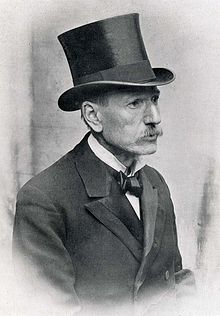Andrea Rabagliati
Andrea Rabagliati | |
|---|---|
 | |
| Born | Andrea Carlo Francisco Rabagliati 1843 Scotland |
| Died | 7 December 1930 (aged 87) Ben Rhydding Bradford, England |
| Nationality | British |
| Education | University of Edinburgh |
| Known for | Doctor and author |
| Spouse | Helen Priscilla McLaren |
| Children | Euan Rabagliati Herman Victor Rabagliati Duncan Silvestro Rabagliati OBE Catherine Rabagliati MBE (Mayor of Paddington) |
Andrea Carlo Francisco Rabagliati (1843 in Scotland – 7 December 1930 in Bradford, England) was a physician and author of books on dietary practice.
Career
Andrea Rabagliati was the son of Giacomo Rabagliati, a political refugee from Italy, and Caroline Kinnison. Giacomo first appeared in an article in the Scotsman newspaper in December 1827, offering his services as a teacher of French, Italian, and Spanish. The Scotsman stated, "suffice it to say, that he (Giacomo) is expatriated from Italy for having carried arms in defence of the liberties of his country, and seeks an asylum and a field for the exercise of his talents in the city."[1]
Andrea graduated with a Master of Arts from the University of Edinburgh, spent some time in Demerara in what was then British Guyana, then arrived in Bradford as a young house surgeon at the Royal Infirmary. He was invested as a Fellow, Royal College of Surgeons of Edinburgh (F.R.C.S.E.). He lived in Whinbrae, Ben Rhydding, Yorkshire, England.
He married Helen Priscilla McLaren, daughter of Duncan McLaren and Priscilla Bright McLaren (sister of John Bright), on 25 May 1877. She was the President of Ben Rhydding Women's Unionist Association for 28 years and of the Wharfedale Conservative Women's Club for several years after World War One.[2] They had five children including Euan Rabagliati, Duncan Silvestro Rabagliati OBE, Catherine Rabagliati MBE (Mayor of Paddington) and Herman Victor Rabagliati.
Dieting
Rabagliati has been described as an advocate of alternative medicine and the "nature cure".[3] Biographer Carole Seymour-Jones has noted that in his book Air, Food and Exercise, Rabagliati described how "cancer, influenza, pneumonia and almost all modern diseases could be cured by diet."[4]
Rabagliati was a convinced vegetarian, who favoured two meals a day, with eight hours between them.[5] One of his notable patients was Beatrice Webb. She was prescribed a milk and soup diet with two ounces of rice for a few weeks. She was influenced by this diet and in 1902 converted to vegetarianism.[3] Rabagliati believed that people could add fifteen years to their lives by following his diet.[6]
Rabagliati held some unorthodox ideas, for example he believed that bodily energy and heat do not come from any food source. Instead he speculated that humans obtain "vital energy" from sleeping. He authored a book about this in 1907 and wrote the introduction to Hereward Carrington's Vitality, Fasting and Nutrition, which expounded on these ideas.[7] A review in the Edinburgh Medical Journal, suggested he was advocating a "modified form of vitalism".[8] His 1907 book was mocked in the Scottish Medical and Surgical Journal, which commented "we are in doubt as to whether to take this book seriously or not. If the latter, it is one of the best scientific jokes perpetrated for many a day."[9]
Publications
- Aphorisms, Definitions, Reflections, and Paradoxes, Medical, Surgical and Dietetic (1901), Bailliere, Tindall and Cox, 291p
- Air, Food and Exercises;: An Essay on the Predisposing Causes of Disease (1904, 3rd Edition)
- The Functions of Food in the Body: Does Either Bodily Energy or Bodily Heat Come From the Food? (1907), Elliot Stock, London, 46p
- Conversations With Women Regarding their Health and that of their Children (1912), C.W.Daniel, London, 318p
- Initis Or Nutrition and Exercises (1930, 2nd Edition), C. W. Daniel Company, London, 200p
- Towards Life: Happy, Healthy, Efficient (1923), C. W. Daniel Company, London, 224p, ISBN 0-85207-031-4
- A Catechism of Health (1928) C. W. Daniel Company, London.
- A New Theory of Energy (Paperback) (2005 reprint), Kessinger Publishing, 48p, ISBN 1-4253-2521-1
References
- ^ The Scotsman, Wednesday 05 December 1827
- ^ Weber, Dan (30 January 2007) Bradford Telegraph and Argus: Lecture recalls politician Helen. thetelegraphandargus.co.uk
- ^ a b Preece, Rod. (2011). Animal Sensibility and Inclusive Justice in the Age of Bernard Shaw. UBC Press. p. 205. ISBN 978-0-7748-2109-4
- ^ Seymour-Jones, Carole. (1992). Beatrice Webb: Woman of Conflict. Allison & Busby. p. 252. ISBN 978-0850318289
- ^ scroll down to section "Doctor's veggie way to a long life" Archived 27 September 2007 at the Wayback Machine. thetelegraphandargus.co.uk (8 March 2000)
- ^ Carole Seymour-Jones. (1992). Beatrice Webb: A Life. Ivan R. Dee, Inc. p. 253. ISBN 978-1566630016
- ^ Anonymous. (1908). Reviewed Work: Vitality, Fasting, And Nutrition: A Physiological Study of the Curative Power of Fasting, Together with a New Theory of the Relation of Food To Human Vitality by Hereward Carrington, A. Rabagliati. The British Medical Journal 2 (2479): 28–29.
- ^ Anonymous. (1907). Edinburgh Medical Journal 22: 437. "The thesis of Dr. Rabagliati's pamphlet, The Functions of Food in the Body (Elliot Stock, London), is that its sole use is to restore waste, not to produce either heat or energy. So far as we understand it, his argument implies a modified form of vitalism, the theory being that, during sleep, man derives his capacity for work and his heat from the all-pervading energy of the universe."
- ^ Anonymous. (1907). The Functions of Food in the Body: Does Either Bodily Energy or Bodily Heat come from the Food? By A. Rabagliati. Scottish Medical and Surgical Journal 20: 479.
Further reading
- "Andrea Rabagliati, M.d., F.r.c.s". British Medical Journal. 2 (3650): 1067. 1930. doi:10.1136/bmj.2.3650.1067-a. PMC 2452969. PMID 20775912.
- Alexander Bryce. (1912). Rabagliati on Energy. In Modern Theories of Diet and Their Bearings Upon Practical Dietetics. New York: Longman's Green & Co.
- Charles Mosley, editor, Burke's Peerage and Baronetage, 106th edition, 2 volumes.
